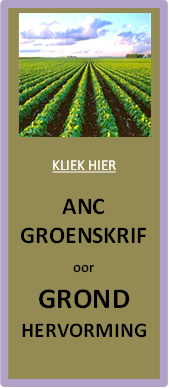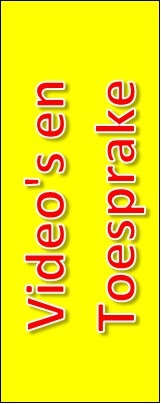Afrikaner
VERRAAD IS ‘N ONGENEESLIKE SIEKTE. DIT HOU NET NOOIT OP NIE!
 Die Mail & Guardian publiseer op 25 April 2014 hierdie onderhoud, genadiglik in Engels, vanPhillip de Wet met Genl. Constand Viljoen, waarmee hy nogmaals sy veragtelike verraaiersrol probeer vergoeilik.
Die Mail & Guardian publiseer op 25 April 2014 hierdie onderhoud, genadiglik in Engels, vanPhillip de Wet met Genl. Constand Viljoen, waarmee hy nogmaals sy veragtelike verraaiersrol probeer vergoeilik.
Daarmee bevestig Viljoen egter net opnuut die skandelike wyse waarop hy met ‘n eerbare beroep omgegaan het om die Afrikanervolk, in sekerlik die mees benouende toestand in ons volksgekiedenis gehelp dompel het.
Wat hierdie soort artikels veroorsaak is dat daar altyd daarop reageer moet word. Indien nie word die indruk onder veral die jongmense en selfs polities onbetrokkenes en dus oningeligtes, onder die indruk van die verraaier(s) se “heroïse heldedade” gebring wat hulle net verder van die waarheid vervreem en ons volk bly verdeel. In die begin kon ons as net negatief afgemaak word. Vandag is dit egter anders aangesien die geskiedenis nou saampraat.
Die opskrif van die artikel beklemtoon juis dat hierdie “laaste boeregeneraal” vrees vir die toekoms. Dit is noual drie jaar later en steeds is daar by hom ‘n Vrees vir dié dinge waarteen hy en elke ander liberalis gewaarsku was indien hulle met hulle pogings van verandering sou voortgaan, reeds so vroeg as 1969, met die skeuring van die NP.
Die stommiteit van Constand se uitlatings in die voornoemde onderhoud, laat ‘n mens duisel om te dink dat hy gekies was as generaal, wát nog te sê as hoof van die weermag en verdediging!
Sy lofbetuigings vir die terroris Mandela saamgelees met sy ongelooflike oortaksering van dié terroris se vermoë, (. Constand Viljoen says Mandela was the "bedevilling factor" in the negotiations in the run-up to the 1994 transition a man who by sheer force of personality shaped the nature of the country. "If what Mr Mandela began had been continued in the years after 1994 then we would have been in a good position," Viljoen says, with about as much respect as one human can muster for another), dui onteenseglik dat Viljoen ingekoop het in die uitverkoping van Suid Afrika! Dit reflekteer egter ook dawerend op sy en die ander onderhandelaars se politieke insig indien nie ook hulle intelligensie nie!
“Coming from Viljoen, blame is, in many cases, praise; in the way that Mandela's influence prevented the formation of a Boer homeland, it also prevented the bloodshed that would almost inevitably have accompanied its birth.”
Die ontkenning van nagenoeg (600,000) seshonderdduisend moorde wat sedert 1994 gepleeg is, trek vandag ‘n dik streep deur die belaglike bangmaakpraatjies van ‘n bloedbad indien die Afrikaner nie sou toegee nie! ‘n Toesmeertegniek wat nie meer steek hou in die lig van alleswat al na die oppervlak gekom het nie.
As Constand die generaal was wat die troepe gelei het deur voor te loop, waarom het hy nie gaan voorloop toe hy Wynand du Toit en sy spesmag doelbewus in Angola, teen hulle beterwete na ‘n RV gestuur het wat reeds aan die vyand gekommunikeer is. ‘n Moorddadige optrede, nie in belang van die Afrikaner of Suid Afrika nie, maar in belang van die vyand. Só is dit in du Toit se boek, “JUDASBOK, VERRAAD TERWILLE VAN OORLEWING” opgeteken nadat die vyand verskeie kere dit aan hom vertel het terwyl hy ‘n gevangene was en selfs daarna. ‘n Oefening waarin Wynand gewond en twee van sy makkers gedood is?
Die feit is dat Viljoen Suid Afrika kastig opgedoek het ter wille van oorlewing soos wat hulle Wynand oortuig het om te glo en vir die verdere drogredes van selfbeskikking en volkstaatjies wat hy en syne nie instaat was om uit die swartes te onderhandel nie! Die eerste toegewing om een Maorie toe te laat om teen die Springbokke te speel, het gelei tot ‘n volgende eis en ‘n volgende toegewing.
Soos wat ons gewaarsku het was die finale eis meerderheidsregering. Dit hét Viljoen nou en hy kan nie daarmee saamleef nie! Die eise sal nie ophou en met die klomp swakkeling humaniste, liberaliste en kommuniste, wat hulleself snaaks genoeg nog Afrikaners noem, sal die toegewings ook nie ophou nie!
Die mees tragiese is dat daar deur hierdie verraaiers op hoë ouderdom nou nog gekies word om met hierdie verraderlike nalatenskap graf toe te gaan! Hoe dit ookal besing en gepoog word om dit te verdoesel, hoe ons wat die waarheid bly publiseer beledig, verguis en as fanatieke regses afgemaak word wat nie die groter prentjie sou verstaan nie, daardie stigma sal bly kleef solank as wat dit nie erken en Suid Afrika as Afrikanerland erken word nie.
Is dit dalk omdat dit in die verraaier se gene of in die bloed sit? Om aan te hou met hierdie verraderlike pogings om die Afrikanervolk te laat afsien van Suid Afrika as ons erfenis? Om iewers waar dit die swartes behaag en steeds onder hulle tragiese sogenaamde “beste grondwet in die wêreld” in so ‘n “volkstaatjie” ons heil moet probeer uitwerk? ‘n Nkandla in jou kop soos wat Zuma ons gun? Het die liberaliste soos Viljoen-en-genote dan nou heeltemal hulle sinne verloor?
Julle uiterste pogings om die Afrikanervolk te laat glo dat ons moet Afsien van Suid Afrika as land van die Afrikaner, het nie, en sal nie slaag nie. Hierdie land is óns land. Die vyftigduisend Afrikaners waarna in hierdie artikel verwys word, is nie weg nie. Hulle mag verdeeld, verward en teleurgesteld in die “politici” wees wat hulle so gruwelik verraai het. Maar hulle is steeds daar en genadiglik nie meer onder Viljoen se invloed nie.
Julle benadering om tyd te koop totdat ons totaal uitgewis is en/of afgesien het van Suid Afrika as ons Godgegewe erfenis, is in die doofpot. Die tyd dat die blankes in Suid Afria bymekaar gedwing gaan word, of ons bymekaar wil wees of nie, is sigbaar op die horison. Mag jy tot jou sinne kom voordat jy sterf, terwille van die jong manne wat hulle lewens op jou vernietigende bevele vir die OU SUID AFRIKA gegee het om hom te kon weggee soos dit vandag is, in jou eie woorde! “The situation is, in a word, dire.!” Dít, Genl. Constand Viljoen, is jou en de Klerk en almal wat julle oortuig het agter julle aan te loop se gevolg!! DIRE!
LAST BOER GENERAL FEARS FOR THE FUTURE (MAIL & GUARDIAN)

The last of the Boer generals blames Nelson Mandela. Constand Viljoen says Mandela was the "bedevilling factor" in the negotiations in the run-up to the 1994 transition, a man who by sheer force of personality shaped the nature of the country.
And that is why, in his view, South Africa does not have (or perhaps does not yet have) an Afrikaner homeland – though that is not why the country is in poor shape.
"If what Mr Mandela began had been continued in the years after 1994 then we would have been in a good position," Viljoen says, with about as much respect as one human can muster for another.
Then his tone changes as his thoughts shift from 1994 to 2014. "I don't think we've ever gone into an election in such a political tangle as what is coming."
Coming from Viljoen, blame is, in many cases, praise; in the way that Mandela's influence prevented the formation of a Boer homeland, it also prevented the bloodshed that would almost inevitably have accompanied its birth.
History now unequivocally records that Viljoen, a former chief of the army and later of the defence force, the soldier's soldier who led from the front in Angola, could have fielded a force of about 50 000 men ready, even eager, to fight for Afrikaner self-determination.
They would have fought for a homeland, or simply to delay the transition and so force concessions from the black leaders-to-be, and the number of those who would have flocked to the banner would have varied accordingly. But this much is sure: Viljoen had his finger on the trigger but chose not to pull it.

As a result, Afrikaners have no territory to call their own and Viljoen will watch the fortunes of the Freedom Front Plus – the direct descendant of the party he formed to contest the 1994 elections – from the farm to which he retired. There he works, still sprightly at 80, with few regrets about the choices made 20 years ago – but deeply worried about what the future holds.
In 1994, Viljoen says, there was hope, direction, ambition and, above all, leadership. Twenty years later, he sees little of any of them – especially leadership.
"We're sitting with a leadership drought. We don't have outstanding black leaders coming to the fore, nor white leaders or coloured leaders."
The country Viljoen sees is mired more deeply in race politics than ever, the polar opposite to the hopes of 1994. The ideals of Mandela "went to the grave with him", and democracy has become oppression by the majority, leaving no consensus on where the nation should head. Inefficient government machinery, affirmative action, labour running amok, a focus on higher pay rather than greater production and the lack of a work ethic has kneecapped the economy. The situation is, in a word, dire.
All of that could be fixed, perhaps, Viljoen concedes. Parliament, a body of which he was a member but found "disappointing", could find renewed purpose, maybe by a change to a constituency-based system of elections – but not in the absence of leadership with vision and high ethical standards.
Likewise, racial quotas in government, sport and the military could be replaced by a meritocracy, the expensive policy of peacekeeping on the African continent could be abandoned, and discussions such as the Convention for a Democratic South Africa could reignite both reconciliation and provide a socioeconomic road map – but not without willing and able leaders.
It is against that backdrop that Viljoen can imagine a new drive for Afrikaner self-determination, if there was greater cohesion among Afrikaners and high-calibre young leaders at the forefront – neither of which are apparent. Unless things get better fast, though, those preconditions could be met, and a shadow of what was contemplated in 1994 could come into being, though cultural rather than geographic.
"The problem with a volkstaat is the spread of Afrikaners within South Africa. You can't easily cordon off an area where there are only Afrikaners and, to tell you the truth, I don't think Afrikaners would move for that."
There are, however, ways and means to soften the effects of one person, one vote: control over schools and institutions of higher learning, for starters, and strong cultural organisations. These could stem the rapid waning of cohesion that Viljoen fears will soon become terminal; they could regroup Afrikaners into a political bloc rather than, in effect, a political nonentity.
Does he believe such a turnaround, a reversal of the impact Mandela had in convincing Afrikaners that self-determination was not necessary, is likely? Not really. But he fears the alternative.
He recently read a book by a Mozambican freedom fighter, Viljoen says. The book itself is, at best, average but an idea in the foreword grabbed his attention. What if, the author argues, Southern Africa had decided in the 1960s not to fight the Cold War as proxies for the contesting superpowers? What if white South Africa had spent money on infrastructure rather than warding off communism, and what if African nationalism in bordering countries had not been hitched to the wagon of the Union of Soviet Socialist Republics? What might have been?
"Today we are suffering the results of a lack of vision in 1960," Viljoen says. "We need to make sure we aren't suffering 20 years from now because of a lack of vision today."
Phillip de Wet










